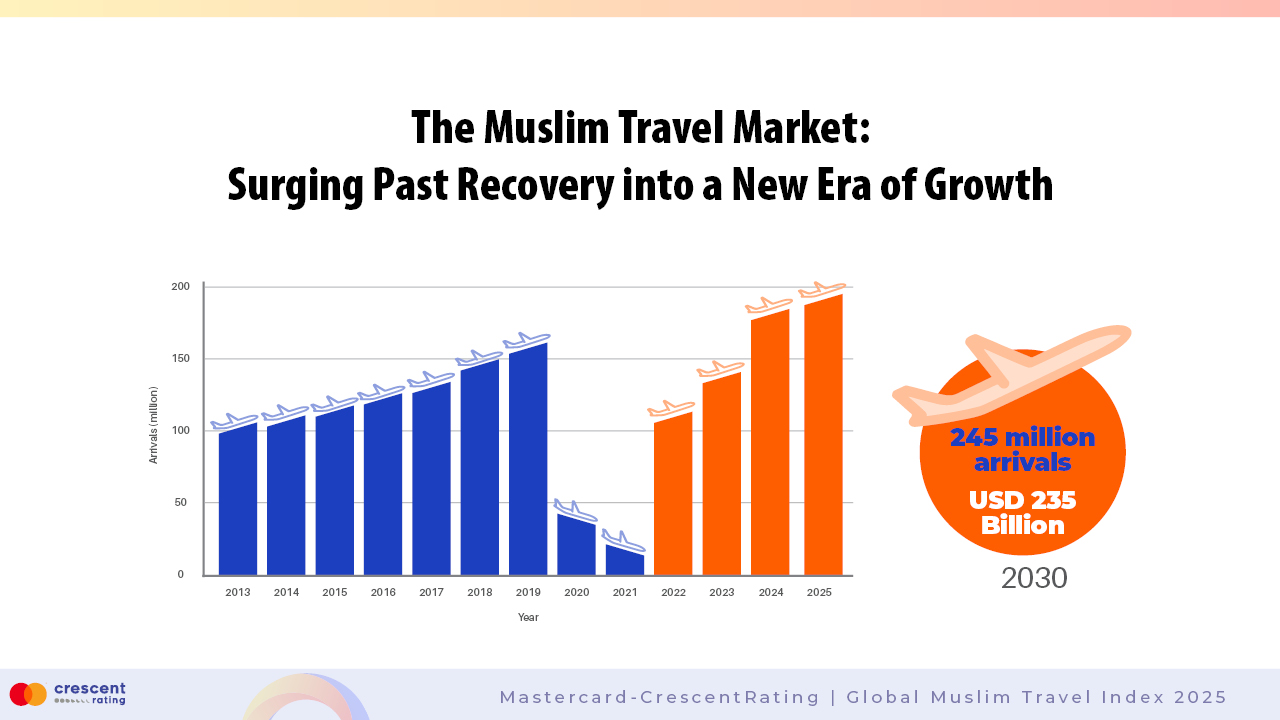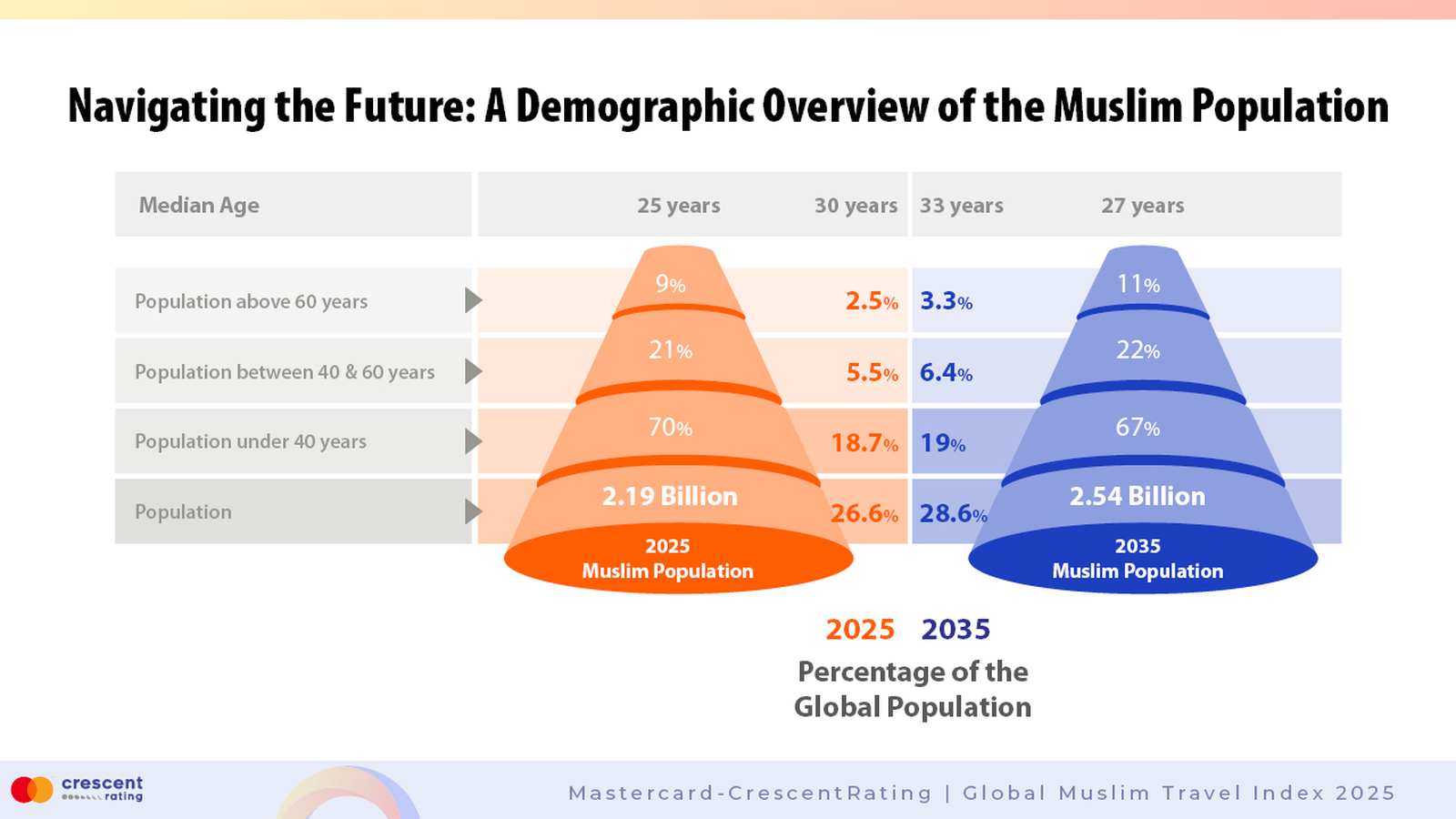
The travel industry is witnessing a significant and transformative period, with the global Muslim travel market demonstrating a powerful resurgence and charting an ambitious course towards 2030. The Mastercard-CrescentRating Global Muslim Travel Index (GMTI) 2025, marking its 10th edition and celebrating an eleven-year partnership, offers a comprehensive overview of this segment, highlighting its remarkable recovery and growth projections. More than just a report, the GMTI serves as a catalyst for change, influencing tourism policies and shaping the development of Muslim-friendly services worldwide.
The year 2024 has been key for the Muslim travel sector, marking a new high and signaling a market resurgence. International Muslim arrivals in 2024 reached an estimated 176 million, a figure that not only indicates a full recovery but also represents a substantial 10% increase over pre-pandemic levels in 2019. This growth is further highlighted by a 25% increase in arrivals compared to 2023, firmly cementing 2024 as the year the Muslim travel sector overcame the pandemic disruptions and embarked on a strong growth trajectory. This milestone sets a new baseline for future development, driven by two key catalysts: growing global demand for Muslim-friendly and Halal-assured tourism services, even in non-Muslim majority destinations, and the continued advancement of technological innovation, particularly Artificial Intelligence (AI), which enhances travel planning and personalization for Muslim travelers.
Looking ahead, the strong performance observed in 2024 is paving the way for sustained positive momentum. The long-term forecast is optimistic, with estimations of 245 million arrivals by 2030. This substantial increase in visitor arrivals is expected to be accompanied by a significant economic impact, with estimated expenditures reaching USD 235 billion by the same year. This growth trajectory is powered by demographic shifts within the global Muslim population. Expected to rise from an estimated 2.19 billion in 2025 to 2.54 billion by 2035, Muslims are projected to account for 50% of the growth in the world’s population during this decade. A significant portion of this growth will be seen in the maturation of large Gen Z and Millennial cohorts into their prime travel and spending years, alongside the expansion of segments among middle-aged (21-50) and mature (51+) travelers. To effectively capture this growing and diversifying market, the industry must continuously expand and refine its Muslim-friendly offerings, ensuring that products and services cater to the specific needs and aspirations of all age groups.

The modern Muslim traveler’s profile and purpose are evolving significantly, marking a clear shift towards more independent and conscious journeys. There is a rising trend of solo and female travelers seeking safety and autonomy, prompting destinations to offer secure and welcoming environments tailored to their needs. Travel motivations are also diversifying beyond traditional leisure, embracing purpose-led experiences such as regenerative tourism, which aims to restore local ecosystems, digital detox retreats aligned with faith values of mindfulness, and sports tourism adapted to meet the needs of families and faith communities. This signals a growing demand for personalized and inclusive travel experiences that cater to a broader range of abilities and interests, pushing destinations to offer more than standard holiday packages.
A standout trend in this year's findings is the consistent and strategic rise of non-OIC destinations in their appeal to Muslim travelers. Destinations like Singapore, the United Kingdom, Hong Kong, Taiwan, Thailand, Ireland, Australia, and Spain are no longer niche players but have become formidable contenders, demonstrating that the core principles of Muslim-friendly hospitality can be successfully implemented in any cultural context. Concurrently, GCC destinations, such as Saudi Arabia, the UAE, and Qatar, are also showing continuous progress and competitive positioning, driven by national strategies and significant investments in infrastructure, hospitality, and cultural experiences. This reflects an increased awareness worldwide of the potential of the Muslim travel market and a concerted effort to integrate essential Muslim-friendly facilities and services.
The Muslim travel market has decisively entered a new era of growth, surpassing pre-pandemic levels and setting ambitious targets for the future. With international Muslim arrivals projected to reach 245 million by 2030, supported by significant demographic shifts and evolving traveler aspirations, the industry is called to deepen its commitment to inclusivity, accessibility, and purposeful experiences. The GMTI, through its robust frameworks and insightful analysis, continues to be an essential tool, empowering stakeholders to seize the immense opportunities within the Halal tourism landscape and ensuring that travel remains a bridge between cultures, celebrating diversity, fostering inclusivity, and ensuring accessibility for all.